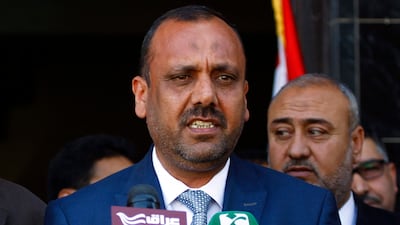A special pardon granted by the Iraq's President Barham Salih to a former governor’s son convicted of drug trafficking has sparked great uproar in a country facing unprecedented levels of drug trafficking and abuse.
In January 2018, Iraqi security forces arrested Jawad Luay Al Yassiri, the son of then Najaf governor Luay Al Yassiri, and two friends who were with him in his car as he drove into Baghdad. They found nearly 6 kilograms of hashish and 7,000 pills, as well as money and a pistol.
The Baghdad Criminal Court sentenced Mr Al Yassiri and his friends to prison terms of 15 years in March that year.
A presidential decree pardoning the men, dated January 10, was leaked on Saturday night ― distributed online by social media accounts and politicians that are against Mr Salih nomination for a second-term in office, along with a letter issued five days earlier by the cabinet. The letter informed the president of Prime Minister Mustafa Al Kadhimi's decision to release the three, asking him to issue the pardon.
Amid a subsequent media uproar, Mr Salih issued brief statement on Saturday night, confirming the pardon's authenticity and defending his action.
“The Presidential Decree was issued after a recommendation we received from the Cabinet Secretariat,” the statement said.
Mr Salih cited Article 73 of the constitution, which gives the president the right to issue a pardon for those charged with specific crimes after a recommendation by the prime minister.
There was no comment from Prime Minster's Mustafa Al Kadhimi’s office on the cabinet's letter as of Sunday afternoon.
Iraqis have directed their anger at both the president and the prime minister for the move, which comes as the country is struggling to combat growing drug trafficking and abuse.
“This has only one explanation. The government sponsors and covers for the crimes that kill Iraqi society and devastate its youth,” columnist Falah Al Mishaal said in a post on his Twitter account accompanied the photos of the pardon and the drugs seized from Mr Al Yassiri, issued by the security forces after the 2018 arrest.
Since the removal of Saddam Hussein's regime in the 2003 US-led invasion, Iraq has gone from being a corridor for smuggling drugs to neighbouring countries to a place where drug use is widespread, mainly among youth.
Security and health officials blame successive weak governments, as well as widespread corruption among security forces, porous borders and a lack of co-operation between government agencies.
Early this month gunmen shot and killed a judge specialising in drug-related cases in the southern province of Maysan. The province, which borders Iran, is considered a major hub for drug trafficking.
“We are seeing today the President of the Republic issuing a pardon for one of the drug dealers as the blood of Judge Ahmed Faisal Khasaf has not dried yet,” the Imtidad Movement, a political party that emerged from the October 2019 pro-reform protests, said in a statement.
“The president had to use these powers to issue pardons for the protesters who have been tried and sentenced based on false accusations,” it added.
The timing of the pardon has also raised speculation that it was part of political deal-making as parties vie to form the next government following the general election in October last year.
Luay Al Yassiri's resignation as governor of Najaf was accepted by the prime minister on January 4, the day before the cabinet issued its recommendation for his son to be pardoned.
A Shiite lawmaker, who asked for anonymity, said the pardon was part of a deal to secure the governor's resignation.
Luay Al Yassiri had said at the time of his resignation that his family had been receiving threats, without offering any details.
Shiite populist cleric Moqtada Al Sadr's political group emerged a clear winner in October national elections, a triumph that has given him the power to play a major role in forming the government.
In a bid to consolidate his power, Mr Al Sadr moved late last year to remove governors in some southern provinces, including Luay Al Yassiri of Najaf.









